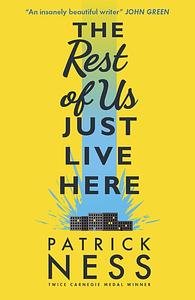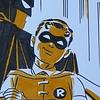You need to sign in or sign up before continuing.
Take a photo of a barcode or cover
This has a cool concept for what seems like a short story. Focusing on the background characters in one of those young-adult supernatural outsider-saves-the-school-and-therefore-the-world type situations.
I'm only a couple of chapters in and I'm concerned that the gimmick will get tired, but if it's really just about a bunch of regular teenagers as they go through their struggles while an end-of-the-world battle rages on about them, maybe this'll be good. I mean I've really liked (and loved) all of Patrick Ness's other books so I have high hopes.
*Several chapters later*
Okay, so Ness manages to keep the concept going by including the summary of the Indy kid adventures at the start of each chapter. It really is just about a bunch of normal kids (mostly) living in a weird world.
I'm about to go into spoiler territory for the most part, so read on with care.
I really liked Mike's discussion with his psychiatrist about mental illness and the stigma attached to it. About how it's okay to take medication just like any other illness. It's not about any sort of moral deficiency, despite how it's often portrayed.
So I found it disappointing Ness went with the trope of Mike deciding against the easy fix and wanting to fight it on his own. Why? If it's really no different than having cancer or a broken leg or osteoporosis then why does Mike have to fall back on that time honoured cliche of seeing mental illness as something that needs to be overcome the hard way? Why is it seen that by taking the easy route Mike is somehow of lesser moral fibre?
This isn't my favourite of Ness's books. It's possibly my least favourite, but that's more about how much I love what I've read before and the resolution of Mike's illness.
I'm only a couple of chapters in and I'm concerned that the gimmick will get tired, but if it's really just about a bunch of regular teenagers as they go through their struggles while an end-of-the-world battle rages on about them, maybe this'll be good. I mean I've really liked (and loved) all of Patrick Ness's other books so I have high hopes.
*Several chapters later*
Okay, so Ness manages to keep the concept going by including the summary of the Indy kid adventures at the start of each chapter. It really is just about a bunch of normal kids (mostly) living in a weird world.
I'm about to go into spoiler territory for the most part, so read on with care.
I really liked Mike's discussion with his psychiatrist about mental illness and the stigma attached to it. About how it's okay to take medication just like any other illness. It's not about any sort of moral deficiency, despite how it's often portrayed.
So I found it disappointing Ness went with the trope of Mike deciding against the easy fix and wanting to fight it on his own. Why? If it's really no different than having cancer or a broken leg or osteoporosis then why does Mike have to fall back on that time honoured cliche of seeing mental illness as something that needs to be overcome the hard way? Why is it seen that by taking the easy route Mike is somehow of lesser moral fibre?
This isn't my favourite of Ness's books. It's possibly my least favourite, but that's more about how much I love what I've read before and the resolution of Mike's illness.
I’ve been on a Patrick Ness kick ever since I recently read the young adult novels, “Release” and “A Monster Calls” (both highly recommended for YA fans!).
This book has two story lines, one featuring high-school senior Mike, who wants to live a normal life and just go to prom and graduate, and the other with the extraordinary “indie kids” – all seemingly named Finn or Satchel – who have the power to save and destroy the world, and, occasionally, blow up the high school.
In the “real world,” Mike struggles with anxiety and obsessive-compulsive disorder, and the family has issues that may be familiar for some readers: Dad is an alcoholic recluse, Mom is a power-hungry politician, sister Mel is an anorexic in recovery who nearly died, and Grandma has Alzheimer’s and lives in a nursing home. The other-world plot is appealing and integrates surprisingly well into the story, especially for those who are fans of superhero movies and realistic fiction television shows with vampires. I recommend this for fans of YA fantasy books and characters like those in a John Green novel.
I could have used this book when I graduated high school, or even college tbh. I was a little iffy at the beginning of the story but as it went on I fell in love with the characters and their lives. This book felt like putting a puzzle piece right where it belongs.
adventurous
challenging
emotional
funny
hopeful
inspiring
lighthearted
mysterious
reflective
sad
tense
fast-paced
Plot or Character Driven:
A mix
Strong character development:
Yes
Loveable characters:
Yes
Diverse cast of characters:
Yes
Flaws of characters a main focus:
Yes
This will forever remain my favorite book in the hole world. Thank you Patrick. Everything's always ending but everything's always beginning,too
hopeful
mysterious
medium-paced
Plot or Character Driven:
A mix
Strong character development:
Yes
Loveable characters:
Yes
Diverse cast of characters:
Yes
Flaws of characters a main focus:
No
adventurous
mysterious
reflective
fast-paced
Plot or Character Driven:
Character
Strong character development:
Yes
Diverse cast of characters:
Yes
Flaws of characters a main focus:
Yes
Saw the ad at the side of the page - "Patrick Ness..." Dunno. Something about his writing being beautiful. And...it's OK. It does the job. It's not profound or literary, it's average. It's full of lots of hats-offs to popular sci-fi/fantasy culture.
I don't like the editing at all. I'd even go so far as to say it's not a patch on mine, and I am not a bragger.
I didn't finish this.
I barely started it, in fact.
Because I read better indie books than this every day.
None of them cost £7 (for an ebook. Really, Harper Collins?)
Still, it was nice to have a reminder of what a false load of shite traditional publishing is. I don't suppose the author cares, with the stats he's generating.
I don't like the editing at all. I'd even go so far as to say it's not a patch on mine, and I am not a bragger.
I didn't finish this.
I barely started it, in fact.
Because I read better indie books than this every day.
None of them cost £7 (for an ebook. Really, Harper Collins?)
Still, it was nice to have a reminder of what a false load of shite traditional publishing is. I don't suppose the author cares, with the stats he's generating.
Fun premise of focusing on the underdogs instead of the traditional heroes. It was reminiscent of Carry On by Rainbow Rowell, but I definitely prefer her writing style.
I did not enjoy this book as much as my Goodreads friend Melinda did, but I did enjoy it. I listened to the audio version, and reader James Fouhey was very good.
It used to be that a book was just written, and it was intended for whoever read it and enjoyed it. These days publishers normally decide who a book's audience is - kids, teens, or adults - and market the book to that audience, even though more than one age group may enjoy the book. Other books are written specifically for an audience, and The Rest of Us Just Live Here is such a book. It is clearly intended just for a teen audience, especially teens dealing with OCD, or anorexia, or alcoholic or distant parents, or having a gay best friend, or feeling like a minor character in someone else's life. (Which I guess is probably just about every teen ever.)
So the Adults Keep Out attitude annoyed me a bit but not too much. Even if I might not strongly recommend this to another adult, I would to teens.
The other thing that annoyed me a bit is that these are the "other" kids, not the "indie" kids who are supposed to save the world all the time (a concept I adored), but Mike's best friend is one quarter god. That seemed to undermine the point a bit.
Still, the plot, the characters, the relationships, and the dialog were very entertaining.
It used to be that a book was just written, and it was intended for whoever read it and enjoyed it. These days publishers normally decide who a book's audience is - kids, teens, or adults - and market the book to that audience, even though more than one age group may enjoy the book. Other books are written specifically for an audience, and The Rest of Us Just Live Here is such a book. It is clearly intended just for a teen audience, especially teens dealing with OCD, or anorexia, or alcoholic or distant parents, or having a gay best friend, or feeling like a minor character in someone else's life. (Which I guess is probably just about every teen ever.)
So the Adults Keep Out attitude annoyed me a bit but not too much. Even if I might not strongly recommend this to another adult, I would to teens.
The other thing that annoyed me a bit is that these are the "other" kids, not the "indie" kids who are supposed to save the world all the time (a concept I adored), but Mike's best friend is one quarter god. That seemed to undermine the point a bit.
Still, the plot, the characters, the relationships, and the dialog were very entertaining.
At first, I felt like this book was solely silly & superficial, but as the narrative continues it gets a bit deeper & the characters became people I cared about. I enjoyed reading the book. It mostly made me smile.
Considerations for teaching: It is a good, light read. Would definitely put it in a classroom library for mainstream high school students. Probably not for my Bridge class just because it really relies on readers understanding parody. And understanding the silliness of so much YA lit. I probably wouldn't put it in a middle school classroom library because characters do have sex.
Identities/ Topics: Mental Health (OCD), Eating Disorder, Male Gay Characters, Biracial character, Alcoholic Parent.
Felt like OCD was treated well. Other topics more superficial. Great conversation between therapist & main character, Mikey.
Considerations for teaching: It is a good, light read. Would definitely put it in a classroom library for mainstream high school students. Probably not for my Bridge class just because it really relies on readers understanding parody. And understanding the silliness of so much YA lit. I probably wouldn't put it in a middle school classroom library because characters do have sex.
Identities/ Topics: Mental Health (OCD), Eating Disorder, Male Gay Characters, Biracial character, Alcoholic Parent.
Felt like OCD was treated well. Other topics more superficial. Great conversation between therapist & main character, Mikey.




